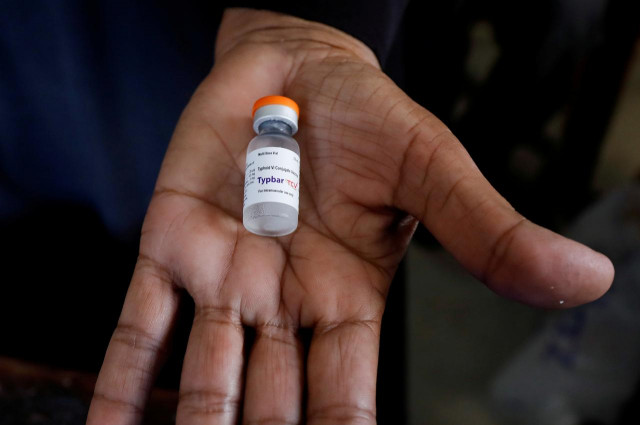Mission typhoid
Typhoid fever is a major burden on our healthcare system

Typhoid vaccination. PHOTO: REUTERS
#MissionTyphoid has been trending on Twitter. To take down typhoid, the Government of Pakistan and GAVI (the Global Alliance for Vaccine Initiative) have introduced TCVs (Typhoid Conjugate Vaccines) in Sindh.
Sindh is the centre of the ongoing extensively drug resistant (XDR) typhoid outbreak which started back in November 2016, in Hyderabad. By August 2019, more than 10,000 cases of XDR typhoid fever had been reported in 23 districts of Sindh, with the most number of cases diagnosed in Karachi.
Typhoid fever is caused by the Salmonella typhi bacteria, which has become extensively drug-resistant in Pakistan. This means that the Salmonella bacteria is resistant not only to the first-line antibiotics — chloramphenicol, ampicillin, and trimethoprim-sulfamethoxazole — used in the treatment of typhoid fever, but is also resistant to ciproxin and ceftriaxone, leaving only one antibiotic, azithromycin, to be effective.
In 2018, British and Pakistani researchers analysed more than 300 extensively drug-resistant (XDR) Salmonella typhi isolates from Sindh and came to the following conclusions: the typhoid bacteria contains drug resistance genes which are present inside its body in a circular DNA molecule known as a plasmid; the plasmid carrying the drug resistance genes can be transferred from one bacteria to another making them resistant to different antibiotics.
Furthermore, we in Pakistan have misused and overused antibiotics and thus greatly contributed towards antibiotic resistance. If this continues, we would soon enter the post-antibiotic era, where a minor skin cut could be fatal as no antibiotic would be effective.
Out of the many Asian countries where typhoid fever is prevalent, Pakistan in general, and Sindh in particular, has the highest risk of developing typhoid fever. Why? Because our society provides ideal conditions for the typhoid bug to live, such as improper sanitation, unclean drinking water, poor hygiene, overcrowding and social chaos.
Typhoid fever is a major burden on our healthcare system. A number of such patients can be seen in both medical as well as surgical wards. Typhoid fever can be treated with medicines but it becomes a surgical emergency when the bacteria attacks the intestine causing it to tear.
Pakistan is the first country in the world to receive typhoid conjugate vaccines. In March 2018, the World Health Organization (WHO) formally recommended the use of these vaccines in the national immunisation programmes of typhoid-endemic countries. India’s Bharat Biotech International Limited is the only manufacturer of TCVs and Pakistan received its first batch of TCVs from India in October 2019.
With funding support from GAVI, the vaccine alliance, a two-week typhoid vaccination campaign took place last month in the urban areas of Sindh with the target of vaccinating 10 million children between the ages of nine months and 15 years. This is to be followed by a transition to routine immunisation of nine-month-old infants in all parts of the province. The vaccine will be introduced in Punjab and Islamabad next year and then nationally in 2021.
Extensively drug resistant (XDR) infections originating in Pakistan also contain a threat for international spread. The United Kingdom, the United States, Australia and Canada are some of the countries which have detected XDR typhoid fever in travellers returning from Pakistan. Can we afford an international travel ban at this point in time?
The growing antibiotic resistance which we are encountering for typhoid fever has dangerously limited our treatment options. Typhoid fever and other similar infectious diseases are not that common in the developed world because they work on disease prevention more than disease treatment. Pakistan should also employ preventive measures such as WASH (water, sanitation and hygiene) intervention and make TCV vaccines readily available throughout the country. This is the only way to break the typhoid curse.
Published in The Express Tribune, December 9th, 2019.
Like Opinion & Editorial on Facebook, follow @ETOpEd on Twitter to receive all updates on all our daily pieces.
















COMMENTS
Comments are moderated and generally will be posted if they are on-topic and not abusive.
For more information, please see our Comments FAQ